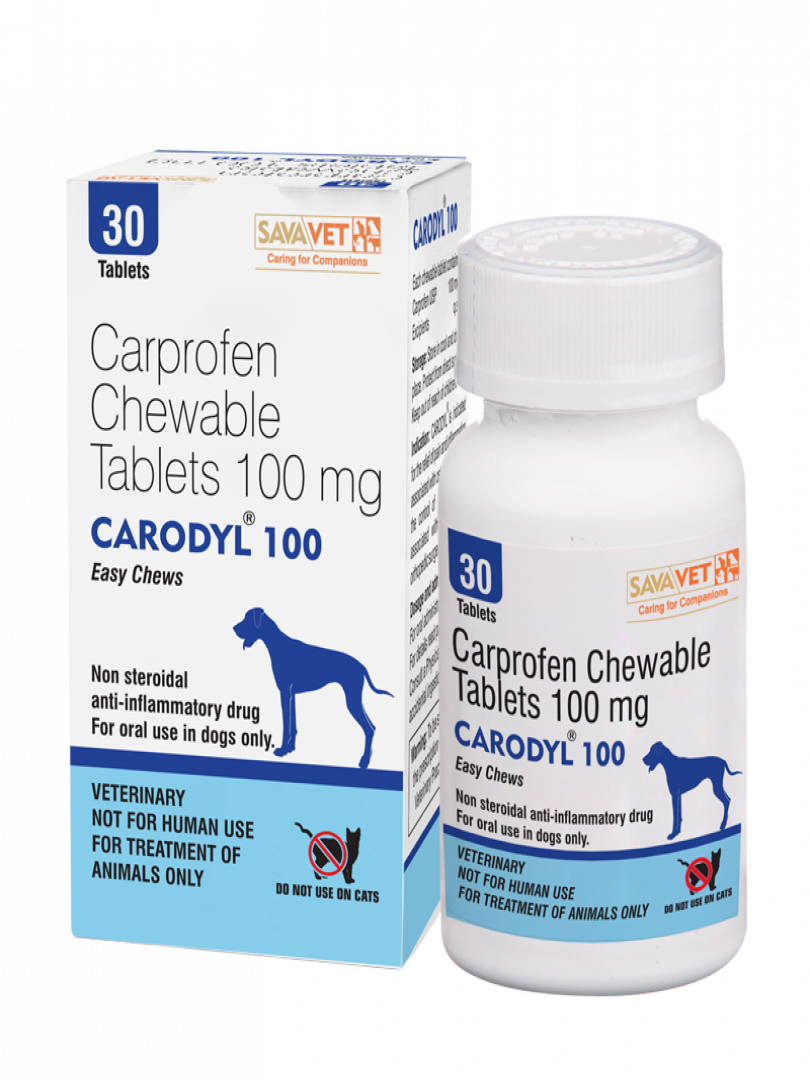COMPOSITION:
Each chewable tablet contains:
Carprofen 100 mg
Excipients q.s.
CHEMISTRY: 6-chloro-α-methyl-9H-carbazole-2-acetic acid.
CATEGORY: Non – steroidal anti-inflammatory drug
DESCRIPTION: Carodyl® (Carprofen) is a non-steroidal anti-inflammatory drug (NSAIDs) of the propionic acid class that includes ibuprofen, naproxen and ketoprofen. Carprofen is the nonproprietary designation for a substituted carbazole.
CLINICAL PHARMACOLOGY
PHARMACODYNAMICS
Carprofen is a member of the 2-arylpropionic acid group of non-steroidal anti-inflammatory drugs (NSAIDs), and possesses anti-inflammatory, analgesic and antipyretic activity. Carprofen is a chiral drug. Carprofen, like most other NSAIDs is an inhibitor of the enzyme cyclooxygenase of the arachidonic acid cascade. However, the inhibition of prostaglandin synthesis by carprofen is slight in relation to its anti-inflammatory and analgesic potency. The precise mode of action of carprofen is not clear.
PHARMACOKINETICS
Carprofen is rapidly and nearly completely absorbed (more than 90% bioavailable) when administered orally. Peak blood plasma concentrations are achieved in 1-3 hours after oral administration of 1, 5, and 25 mg/kg to dogs. The mean terminal half-life of carprofen is approximately 8 hours (range 4.5-9.8 hours). Carprofen has a small volume of distribution and a low systemic clearance. It is highly bound to plasma protein.
Carprofen is metabolized in the liver by conjunction and oxidation. The excretion of the glycuronide conjugate is mainly fecal after biliary excretion.
INDICATIONS:
Carodyl® is indicated for the relief of pain and inflammation associated with osteoarthritis and for the control of postoperative pain associated with soft tissue and orthopedic surgeries in dogs.
DOSAGE AND ADMINISTRATION:
For oral administration to dogs.
An initial dose of 2 mg to 4 mg carprofen per kg bodyweight per day in two equally divided doses. After seven days, dose may be reduced to 2 mg per kg bodyweight per day as single daily dose subject to clinical response. Long term treatment should be under veterinarian’s supervision.
CONTRAINDICATIONS:
Carodyl® should not be used in dogs exhibiting previous hypersensitivity to carprofen.
Do not use in dogs suffering from cardiac, hepatic or renal diseases.
Do not exceed the recommended dose.
WARNINGS:
All dogs should undergo a thorough history and physical examination before initiation of NSAIDs therapy. Appropriate laboratory tests to establish hematological and serum biochemical baseline data prior to, and periodically during, administration of any NSAIDs should be considered.
Owners should be advised to observe for signs of potential drug toxicity.
Consult a physician in cases of accidental ingestion by humans.
For use in dogs only. Do not use in cats.
PRECAUTIONS:
Carodyl® is not recommended for use in dogs with bleeding disorders (e.g., Von Willebrand’s disease), as safety has not been established in dogs with these disorders. The safe use of Carodyl® in animals less than 6 weeks of age, pregnant dogs, dogs used for breeding purposes, or in lactating bitches has not been established.
If additional pain medication is warranted after administration of the total daily dose of carprofen, alternative analgesia should be considered. The use of another NSAIDs is not recommended. Consider appropriate washout times when switching from one NSAIDs to another or when switching from corticosteroid use to NSAIDs use.
Due to the palatable nature of Carodyl® chewable tablets, store out of reach of dogs in a secured location. Severe adverse reactions may occur if large quantities of tablets are ingested. If you suspect your dog has consumed Carodyl® chewable tablets above the labeled dose, please call your veterinarian for immediate assistance.
PREGNANCY AND LACTATION
The safety of carprofen in pregnant or lactating animals has not been established. Do not use in pregnant or lactating bitches.
ADVERSE REACTIONS:
Typical undesirable effects associated with NSAIDs, such as vomiting, soft faeces/diarrhea, fecal occult blood, loss of appetite and lethargy have been reported. No clinically significant adverse reactions have been reported. If adverse reaction occurs, use of the product should be stopped and the advice of a veterinarian should be sought.
INFORMATION FOR DOG OWNERS:
Carodyl®, like other drugs of its class, is not free from adverse reactions. Owners should be advised of the potential for adverse reactions and be informed of the clinical signs associated with drug intolerance. Adverse reactions may include decreased appetite, vomiting, diarrhea, dark or tarry stools, increased water consumption, increased urination, and pale gums due to anemia, yellowing of gums, skin or white of the eye due to jaundice, lethargy, incoordination, seizure, or behavioral changes. The vast majority of patients with drug related adverse reactions have recovered when the signs are recognized, the drug is withdrawn, and veterinary care, if appropriate, is initiated. Owners should be advised of the importance of periodic follow up for all dogs during administration of any NSAIDs, wash hands after handling the product.
ANIMAL SAFETY: Reported studies in unanesthetized dogs and clinical field trials have demonstrated that Carodyl® is well tolerated in dogs after oral administration.
PRESENTATION: Bottle of 30 tabs
STORAGE: Store in cool and dry place. Protect from direct sunlight.
Keep out of reach of children.
For oral use in dogs only.

